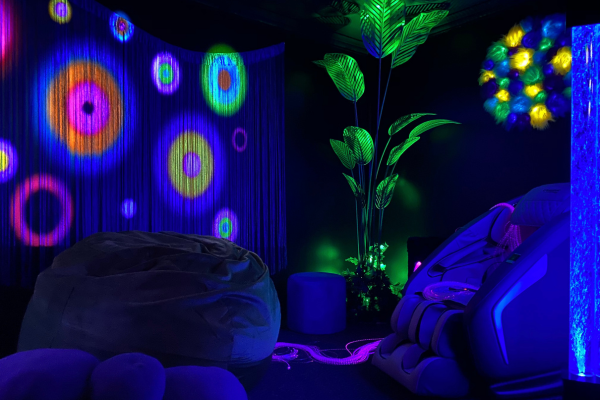Neurodegenerative disorders cause the breakdown of brain cells, changing how a person moves, thinks, feels or behaves.
Conditions like motor neurone disease, Alzheimer’s disease, Parkinson’s disease and Huntington’s disease become more common with age, are progressive (meaning they worsen as time goes on) and are not easy to treat.
That’s why many residential aged care facilities, nursing homes and health centres are becoming interested in sensory rooms for seniors.
Table of Contents
ToggleThe impact of neurodegenerative diseases
While each neurodegenerative condition has its own specific effects on the body, they create some common experiences for the affected individual such as:
- Limiting personal autonomy
- Reducing the ability to participate in meaningful activities
- A sense of frustration, isolation and disconnection
- Mood swings and behaviour changes.
Those are intensely difficult feelings to deal with. Alongside medical support for their condition, people also need help as they navigate the sometimes overwhelming personal impact.
That’s where a sensory room can help.
What is a sensory room?
Sensory rooms are purpose-designed spaces that stimulate and engage the senses to create a therapeutic benefit.
Our sensory spaces blend art and science to create an immersive experience in a refreshing, multisensory environment. In a Creative Sensory Spaces sensory room, you’ll find a bold yet harmonious, nature-inspired space that uses light, sound and touch to promote mental and emotional refreshment.
It’s room to reset.
The benefits of sensory rooms for seniors with cognitive decline
Spending time in a sensory room can help seniors with neurodegenerative conditions to relax.
As researchers from London’s Kingston University comment,
“After spending time in a Sensory Room, residents in the later stages of dementia show positive changes in mood and behaviour, and also an increase in attention to their surroundings. Staff feel that these improvements help with their relationship with the residents and their daily work.”
Earlier research found that sensory rooms led to a reduction in feelings of sadness, fear and boredom and an increase in positive emotions or happiness, enjoyment and relaxation in
people with dementia.
The benefits of sensory rooms for all seniors
It’s not only seniors with neurodegenerative conditions who benefit from sensory rooms. All seniors can benefit from being in a calming space that soothes the senses.
Many senses decline with age. Seniors may experience a decline in their ability to see, hear and move. Even the sense of touch may decline due to nerve damage. That can affect confidence, independence and other aspects of wellbeing.
Spending time in a calming sensory room enables people to gently experience declining senses and focus on those that are still working well.
Best of all, this all happens in a non-pressured environment. Calming sensory rooms don’t require people to do anything. Their purpose is to help seniors retreat from the world for a little while to find refreshment.
How can Creative Sensory Spaces help?
At Creative Sensory Spaces, we design, create and install amazing sensory rooms with bold yet harmonious, nature-inspired themes that promote mental and emotional refreshment by engaging the senses.
We always design with the audience in mind. Seniors need a space that reflects their maturity and creates a sense of calm with a dash of playfulness.
We know how to bring it all together. Many sensory spaces achieve far less than they could because the elements don’t work well together. As Australia’s leading experts in sensory rooms, we know how to create a design that suits your audience and your budget.





